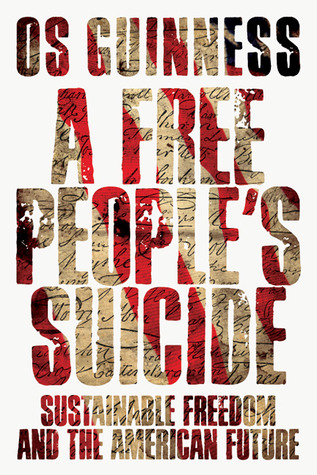
In a majestically grumpy new book, social critic Os Guinness tells Americans something we need to hear: our freedom is in peril. The first step in safeguarding it? Study history.
Os Guinness is a British scholar whose trenchant critiques have been fodder for more than two dozen books and have landed him fellowships at The Brookings Institution and the Woodrow Wilson Center for International Studies. Are you impressed yet? You should be. Guinness is an author I've been meaning to read for years, so I jumped at the chance to participate in Patheos's roundtable discussion of his latest book, A Free People's Suicide: Sustainable Freedom and the American Future.
If the title sounds grim, that's because it is. Guinness is no happy-go-lucky de Tocqueville, extolling the virtues of a freshly minted American nation. He is a prophet, a Jeremiah to be precise, which means his words are live-saving but will all too often be ignored by a people who do not have ears to hear.
Guinness's main point is that America stands at a crossroads, and we have to figure out how to maintain what he calls a “sustainable freedom.” He identifies three stages to freedom.
- Winning freedom. This is actually the easy part. In America, it took eight years (1775 to 1783). In Syria, it looks like it will have taken just under two. I was thinking of Guinness's book when I listened to this NPR story this morning; as the dozens of rebel groups in Syria get closer to toppling al-Assad's government, the talk is now turning to what a new unified government will look like. Syria is headed in to Stage 2, which is . . .
- Ordering freedom. Americans seem to take it for granted that first we had a Revolution, and then we had a Constitution, the second following the first readily and without fuss. That was not the case historically, but it is true that America managed the transition from revolution to government more easily than most. The foil Guinness uses is France, which “copied the American idea of Revolution but not the American idea of government.” Liberty, equality, and fraternity gave way in short order to mob rule and the guillotine before succumbing to the likes of Napoleon. Bottom line: Ordering freedom is more difficult than merely having a revolution. (See also Russia, China, Haiti, and many other examples.)
- Sustaining freedom. This is the long haul, the boring part, the part that Americans rarely discuss because it is decidely unsexy. But it is also the most important, and one the Founders took extremely seriously. So should we.
So why did the Founders see the importance of what Professor Moody would call “constant vigilance” where our freedoms are concerned, and we are more likely to spend the Fourth of July pondering the contents of our picnic basket than the state of the nation? Guinness says that's because the Founders threw themselves into the study of history, and we do not.
In what I found the most brilliant and chilling chapter of the book, Guinness lays out how the Founders “used history to defy history,” consciously studying examples from the past, particularly from antiquity, to avoid making the same mistakes. He also masterfully identifies a classical parallel to America's current situation: when Rome was at the beginning of its end. (If you're not familiar with Roman history — which wouldn't be surprising since Guinness is correct that most Americans don't study our own history, let alone that of other cultures — just read The Hunger Games trilogy again. That's basically it, only without the love triangle.)
Guinness says that now is the time for America to identify the measures needed for a sustainable freedom — or else we are on a crash course for suicide.
Nations are most vulnerable, not when they are weak, but when they are strong. For unless guarded vigilantly, prosperity leads to hubris (the presumption of invulnerability), hubris leads to folly and folly to nemesis, or self-induced judgment. The moment of success is the moment to be most vigilant. Careless celebration is rife with peril.
From this you can see why he's not going to be your first invitee to a cocktail party, but why you need to read his book. He pulls no punches.
And he has history on his side. Throughout recorded history, there have been more than seventy empires that have stretched beyond the boundaries of their nations of origin to be the leaders of their world. If you look at the ones that are still standing . . . . Oh, wait. You can't. That's because there aren't any.
Read the book, America.





